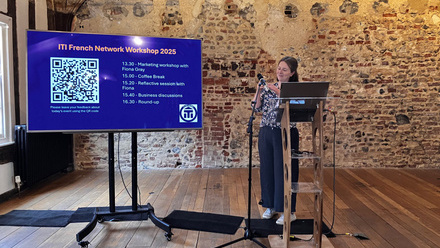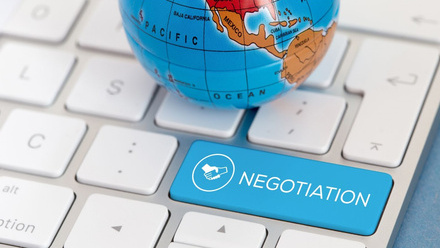Summary of ITI open meetings on generative AI
In August and September 2023, Nicki Bone, Chair of the Board and Sara Crofts, Chief Executive, hosted two open meetings of ITI members to discuss the topic of generative AI.
These meetings were attended by approximately 75 ITI members and we were grateful for the support of our cohort of volunteer rapporteurs. The discussions were wide-ranging, thoughtful and interesting and have provided useful insights that will help us to shape our advocacy and training programmes over the coming months. The ideas that emerged will also be passed to the new AI Working Group to consider in more detail.
The following summary of the two events was produced with the aid of generative AI. We used Otter.ai to produce a transcript from the recordings of the plenary sessions from the online meetings and then we used ChatGPT to produce a summary and extract the proposed actions. The text below is the result of that process and has only been lightly edited.
A summary of the points raised in the open meetings
The participants in the discussion started by sharing their initial thoughts and feelings about generative AI. They expressed interest in understanding how AI could affect their work and were curious about the opportunities it might present.
Uncertainty about the future: Participants expressed uncertainty about how the translation profession might evolve in the next five years due to AI advancements. There was a sense that the market could become more polarised, with opportunities for highly specialised translators but potential challenges for those entering the field.
Impact on rates: Concerns were raised about AI potentially affecting rates in the translation industry. It was suggested that rates might vary based on specialisation and language pairs, and some translators may face increased competition from AI.
Concerns about quality: One of the primary concerns raised was about the potential trade-off between quantity and quality in AI-driven translation. There was apprehension that AI might prioritise volume over quality, potentially leading to lower-quality translations. The discussion touched on the fact that translation is not a regulated profession in some places. Participants expressed interest in addressing this issue to establish standards and guidelines for translators.
Impact on new linguists: The participants discussed the potential consequences of reduced demand for human translators due to AI. They were concerned about the impact on new linguists and graduates who might have limited opportunities to apply their translation skills if AI becomes more prevalent. Including AI-related education and training in translator courses was suggested, particularly for younger generations entering the profession. The importance of preventing overreliance on AI, especially among younger translators, was also stressed. Translators should maintain a critical approach and not assume that AI provides a definitive solution.
Diversification: To adapt and remain successful in the changing landscape of translation, the participants emphasised the need to diversify their services. This might include offering additional skills, such as linguistic consultation and validation, to complement traditional translation work.
Client awareness: Educating clients about the value of human translators and the potential risks of relying solely on AI was a key theme. Participants believed that clients needed to understand the benefits of human translation, including cultural nuances and contextual accuracy. Suggestions included creating materials or brochures for clients and raising awareness about the risks of relying solely on AI for translation.
Collaboration: Collaboration among industry professionals, translation organisations, and educational institutions was seen as crucial. Participants discussed the potential for collaboration between professional translation organisations like ITI and the CIOL. Leveraging corporate members to convey the risks of AI to their clients and ensure transparency in client relationships was also proposed. Some participants suggested monitoring how other professions are adapting to AI and exploring potential collaborations with them. This cross-disciplinary approach could lead to shared insights and solutions.

Advocacy for the profession: The need for advocacy was stressed repeatedly. Participants saw value in ensuring that communications from professional organisations are positive and constructive, focusing on the value that human translators bring. Many participants emphasised the continued importance of the human touch in translation, especially for emotional or complex texts. While AI can assist, the quality, empathy, and creativity of human translators were seen as irreplaceable. They also emphasised the importance of advocating for the profession, lobbying governments, and representing translators’ interests in the changing technological landscape. The suggestion was made to have a clear mission statement or declaration on the ITI website that highlights the importance of human translation in an AI-affected world. It was emphasised that ITI and other professional bodies should focus on positively promoting the value of human translation rather than solely highlighting the risks posed by AI. Participants suggested forming partnerships and working collectively to address the challenges posed by AI.
Transparency and quality: There was a call for industry standards, certification, and transparency when using AI tools for translation. Maintaining high-quality standards in translation work was considered essential to differentiate human translation from AI-generated content.
Education and training: Continuous professional development (CPD) and training were seen as vital for translators to stay up to date with AI tools, specialised knowledge, and technological advancements in the profession. This includes understanding the strengths and limitations of AI translation. Participants stressed the need for ongoing education and training for translators to adapt to AI tools effectively; this includes training on how to use AI tools and improve efficiency. Training could also focus on ethical considerations when using AI in translation. Participants discussed the idea of specialised training for translators who become AI experts to teach others and guide ethical AI usage within the profession.

Ethical concerns: Ethical issues related to AI, such as copyright and confidentiality, were raised. Participants acknowledged the importance of addressing these concerns as AI becomes more integrated into translation processes. Concerns were also raised about data security and confidentiality when using AI tools. Some suggested the need for on-site solutions to ensure data privacy. There was a suggestion to develop a code of conduct or guidelines to help translators avoid legal and ethical pitfalls when working with AI tools.
In summary, the participants in the discussion were actively engaged in addressing the challenges and opportunities presented by AI in the translation and interpretation profession. They highlighted the need for education, advocacy, collaboration, and maintaining the quality and integrity of human translation services in an evolving landscape shaped by AI technologies.
Suggested actions for ITI
Advocacy and client education:
- Increase advocacy efforts to promote the value of human translators
- Develop a clear mission statement highlighting the importance of human translation
- Encourage Corporate members to advocate for ethical AI use and transparency
- Develop educational campaigns and materials to inform clients about the value of human translators, emphasising the benefits of cultural nuances, contextual accuracy, and the potential risks of relying solely on AI-generated translations.
Collaboration:
- Foster collaboration among industry professionals, translation organisations, educational institutions, and developers of AI tools
- Collaborate with other professional translation organisations to share knowledge and strategies for addressing AI’s impact
- Partner with AI experts, researchers, and developers to stay informed and influence AI tool development
- Explore collaboration with other professions adapting to AI.
Continuous Professional Development (CPD):
- Develop training to keep translators updated on AI tools and advancements
- Develop specialised training programmes to help linguists make effective use of AI tools
- Create advanced training for AI specialists to guide ethical AI usage
- Encourage translators to diversify their services, including linguistic consultation and validation
- Encourage translators to adopt a client-focused approach by educating clients and emphasizing how human translators add value to businesses.
Industry standards and regulation:
- Establish industry standards and certification for using AI tools in translation
- Develop guidelines and a code of conduct for ethical AI usage, including promoting transparency in AI-assisted translation processes
- Promote the benefits of regulating the profession
- Address ethical concerns such as copyright and confidentiality, including advocating for data security solutions for client data protection
- Engage with governments, industry organisations, and businesses to align regulations with professional needs.
These actions could collectively empower the translation profession to adapt to AI while maintaining quality, ethics, and professionalism. By focusing on education, ethics, advocacy, collaboration, and positive communication, organisations like ITI can ensure the continued success of human translators in an AI-affected world.







